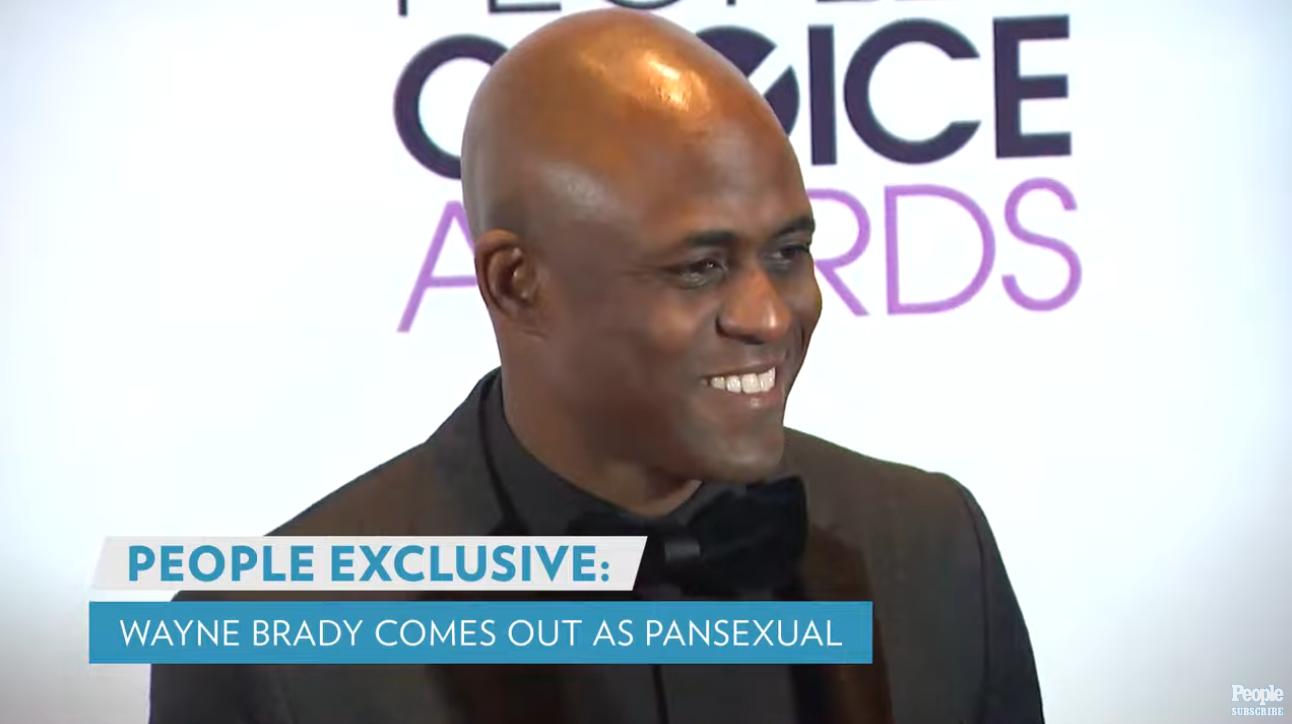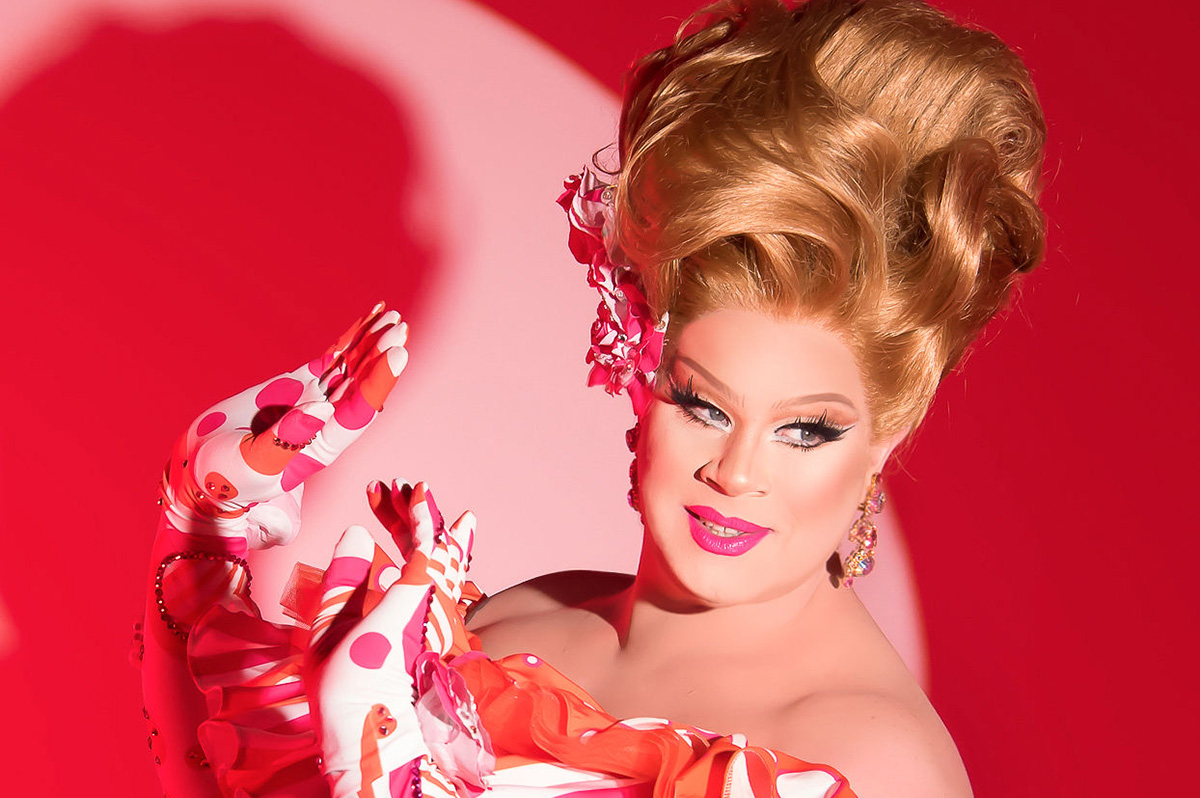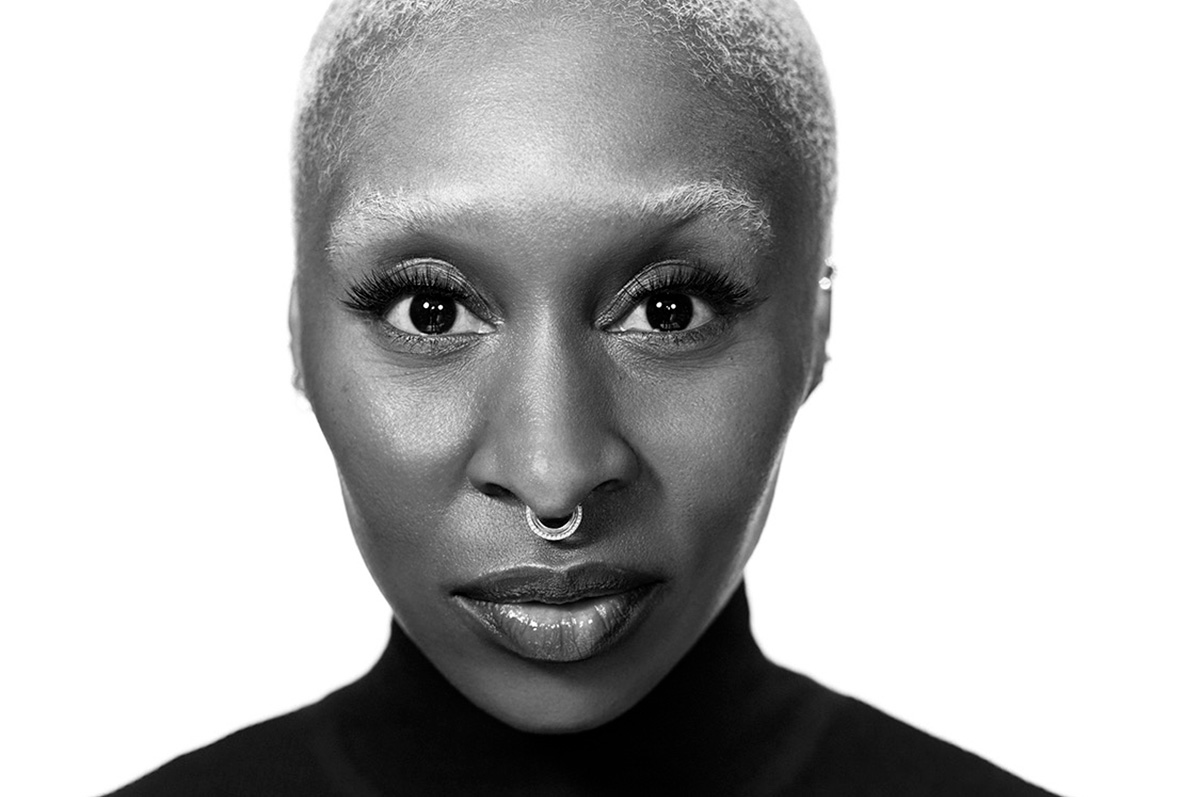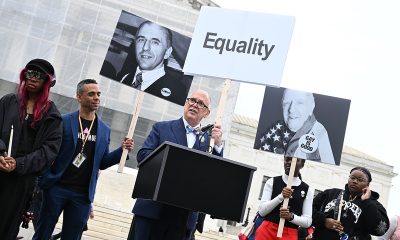Celebrity News
Why Wayne Brady coming out as pansexual is a big deal
‘Let’s Make A Deal’ host spoke exclusively with People magazine

Someday it won’t matter when a celebrity comes out as LGBTQ, but until that day comes, when every orientation and identity is embraced, accepted and respected equally, this is how it goes: Wayne Brady told TikTok and Instagram followers that he is pansexual, and People magazine told the world.
“I am pansexual,” he told the magazine’s Jason Sheeler in an exclusive interview. “Bisexual — with an open mind!” Brady added.
Sheeler explained to People readers that this means he is “attracted to persons regardless of their sex or gender.” In its wide-ranging media guide, GLAAD defines “pansexual” as “an adjective used to describe a person who has the capacity to form enduring physical, romantic, and/ or emotional attractions to any person, regardless of gender identity. This is one of several terms under the bi+ umbrella.”
As the most mainstream television personality to come out so far, Brady is a standout among other pan celebrities, including Miley Cyrus, Demi Lovato, Janelle Monáe, Cara Delevingne, Asia Kate Dillion, Jazz Jennings and JoJo Siwa.
View this post on Instagram
@tubbynugget Surely I’ll be functional after another nap…SURELY 🥹 Be right back friends!! 🥰
Brady, 51, shot to stardom in 1998 on “Whose Line Is It Anyway?” the TV show that showcased his enormous talent at improvisation, a program that’s still on the air with Brady now serving as an executive producer. The Georgia native is also an actor with dozens of credits to his name, in movies, on Broadway and on television, and served as the host of the rebooted “Let’s Make A Deal.”
The first person Brady came out to was his ex-wife, Mandie Taketa. “I just said, ‘Great.’ As I knew coming out would help him be happier,” she said.
Taketa is co-parenting a toddler with both Brady and her partner, Jason Fordham. Brady and Taketa, 47, also have a daughter, Maile, 20. The blended family of four are currently filming a reality show for Hulu, according to the magazine.
“I love all people equally, and now that includes myself,” said Brady. That’s a turnaround from a bitter time more than 20 years ago, when the actor had a falling out with a writer on “The Chappelle Show.” It was over a joke that Brady insisted as recently as 2021 offended him mostly because it wasn’t funny: “White people love Wayne Brady because he makes Bryant Gumbel look like Malcolm X,” the late Paul Mooney said on Dave Chappelle’s sketch comedy show.
Brady was later invited to appear on the show in a hilarious and memorable sketch that portrayed him in an entirely different light.
For People magazine, Brady wrote his own coming out story, which appears below in full:
“I’m pansexual.
In doing my research, both with myself and just with the world, I couldn’t say if I was bisexual, because I had to really see what that was, especially because I really have not gotten a chance to act on anything. So, I came to pansexual because — and I know that I’m completely messing up the dictionary meaning — but to me, pan means being able to be attracted to anyone who identifies as gay, straight, bi, transsexual or nonbinary. Being able to be attracted across the board. And, I think, at least for me for right now, that is the proper place. I took pan to mean that not only can I be attracted to any of these people or types physically, but I could be attracted to the person that is there.
People think they really know me. That has its advantages and disadvantages.
Like with any blessing, I’m like, “How cool.” It’s cool that people like me, especially doing a show, like Let’s Make a Deal, or when various companies or networks think, “I want Wayne Brady to host this,” what a blessing! What a blessing to be in people’s homes every day and connect with them. I love that piece of it. But there are days that I’m not a fan of it. Because, really, I’m an actor. I don’t want to lead personality-first.
There’s a reason why I live in a canyon in Malibu and not in the middle of Hollywood. I’m an introvert. Shy. I always have been. I had a very thick stutter at one point during my childhood, growing up in Orlando, brought on by anxiety and bullying and stress. I couldn’t communicate the way that I wanted to until I started acting, singing and performing.
As characters. I was Tigger and Goofy and a Toy Soldier in the Disney Christmas parade. I loved that because you see the work. You don’t necessarily see me. I love bringing joy, which is why I love being a character: If I can do that as a character, so maybe the character is Wayne Brady. There’s a lot of therapy that I’m doing right now. I wish I didn’t care what people think of me, but the fact of the matter is, I do care. It’s a weird dichotomy, going from a screaming audience to sitting in a house, just chilling all by yourself.
Robin Williams’ death in 2014 really impacted me — and set me on my path to self-discovery.
After Robin’s death, I got involved in certain groups, like Glenn Close’s group, Bring Change to Mind, being very vocal about mental health. And not just the buzzword of mental health, but really what do I have to do to function in this big world and still be okay with yourself and more importantly, to love yourself so that you don’t hurt yourself? Not even just physically hurting yourself, but not taking care of yourself because you are depressed and frightened and weighed down.
Once I opened that door to myself though, I had to start learning about myself, and I had to start owning up to things that maybe I’d either repressed, suppressed, or just didn’t wanna deal with. I’ve done a lot of work on a lot of other things until now, one of the last things on that checklist was, what’s one of the last things that you need to be really happy and to be truly, authentically yourself? I gave joy at work. But the pity is then I come home, and I don’t have that joy. I have joy because I love my daughter and I love my family. I love being a dad more than chocolate ice cream. But that can’t be my only joy. I have to love myself. And that’s when I realized that I had a problem because if I can spend everything on stage and on camera but then I come home and there is a love deficit, what is going on? That was my rock bottom.
I was never suicidal, but I have empathy for those who face those thoughts.
I understand it now. I got to a point where I thought, ‘I’m not here, then whatever this pain is, whatever this loneliness is, this soul-crushing loneliness, I could stop it. I could be absolutely pain-free of whatever this is inside of me.’ And when I felt that, I went, ‘Oh, s–t. Okay. let’s get to the bottom of it. Let’s do it now.’
I did all the therapy I could do. I was treated for love addiction. It’s a part of my journey. I had to start examining why I was looking for myself and happiness in a slew of people. If I marry this person, then everything will be fine. If I date this person, everything will be fine. I’ll be good. I’ll be fixed. That is obviously a problem. And so, in doing that work, I now know absolutely that love addiction is borne of trauma. I can’t feel any shame around that, just like I wouldn’t shame somebody if they said they were addicted to meth or cocaine. That’s a sickness.
What am I looking for in these people that I can’t find in myself? And then leaving a wake of people and never being satisfied and then going back to being lonely. Fast forward to recently asking myself the question: ‘Wayne, um, are you gay?’ And the answer was no because despite having been in all of these unsuccessful relationships and now dealing with what I know can be diagnosed as love addiction, I started to go, ‘Okay, I’m feeling something, but I just don’t know how to get there.’ And then I felt like a fraud.
I’ve been attracted to men at times in my life. But I have never dated a man.
Let’s be really honest: I’ve also been attracted to certain men in my life, but I’ve always pushed that aside because of how I was raised, and because I live in today’s world, and it’s scary as s–t. What’s the fastest way to hurt another man? I’m gonna call you out of your name. I’m gonna call you gay. I’m gonna emasculate you. I’m gonna use the F-word. I learned that very early from the people around me, they’re like, ‘Oh, so those are bad things? Yeah. You, you don’t wanna be that.’
So, what does it mean if I feel something? I don’t think I’m gay, but what if I feel something for another [man] … That’s still gay. I was already bullied about a bunch of other s–t. I didn’t wanna add a top hat on top of that suit.
I’ve dealt with the shame.
A shame cake, just eating it every single day — and then worried about … people finding out. I’ve always had a wonderful community of friends who are in the LGBTQ+ community, people that I’ve grown up with in shows, gays and lesbians, and, later in life, my trans relatives and my niece. I’ve always had that community, but I’ve always felt like a sham because I wasn’t being forthcoming with myself. I could speak out about Black issues because I can’t hide that. And you can play at being an ally, but until the day that you can truly say, ‘This is who I am, and I wanna stand next to you,’ that’s not … I always wanted that day to come.
I’ve told myself in the past, also, nobody needs to know my personal business. The world can absolutely go without knowing that Wayne identifies as pan. But that gave me license to still live in the shadows and to be secretive. What does that feel like to actually not be shameful, to not feel like, ‘Oh, I can’t be part of this conversation because I’m lying?’ I had to break that behavior.
I’m now trying to be the most Wayne Brady I can be.
I don’t know about most, actually. I’m still coming together. But If I’m healthy, then I can go onstage at Let’s Make A Deal and be the best Wayne Brady that everybody wants and expects. I can be the best dad that Maile needs. I can be the best friend to Mandie, the best son to my mother, and one day, the best partner to someone, because I’m doing this for me. Not dating yet though! [Laughs] I am single, but it’s not about being with someone right now. I’ve got some work to do still. Then, Wayne as a single, open-minded pansexual can make a decision and be free and open to other people.”
Follow Wayne Brady on Instagram at @mrbradybaby and on TikTok at @waynebrady
Celebrity News
Nina West’s ‘Sugar in the Tank’ tour comes to Rehoboth Beach
Drag Race’ contestant will be at Clear Space Theater Company on July 6

Nina West, a drag queen known for competing on “RuPaul’s Drag Race,” is currently on her ‘Sugar in the Tank’ tour around U.S. cities.
With previous shows in Key West, Fla., New York, and hometown of Columbus, Ohio, the tour is staying put in Provincetown, Mass., from late July to early September. It will make a stop at Clear Space Theater Company in Rehoboth Beach, Del., as part of a summer cabaret series on July 6.
Andrew Levitt has been performing as Nina West for 25 years, who got her rise from starring in “Drag Race” Season 11, where she placed sixth and won Miss Congeniality, a title awarded to the contestant who is regarded as the kindest and most helpful one of that season.
West has toured “Hairspray” on Broadway as Edna Turnblad, starred in a couple of feature films and published a children’s book titled ‘The You Kind of Kind.’
Levitt said he wrote this show in response to attacks from the government towards the LGBTQ community.
“‘Sugar in the Tank’ is a big old gay fabulous summer musical,” Levitt told the Washington Blade. “The show is a response to the darkness that I think has fallen over a lot of people in the country and it’s hopefully trying to bring a little bit of light and a little bit of joy.”
“Sugar in the Tank” is a Southern euphemism for gay, often holding a negative connotation. Levitt said he wanted to “reclaim and embrace” queerness in times when some people want to take that away.
Levitt said he knew he would be traveling to predominantly queer destinations like Key West and Provincetown for these shows and that was always at the forefront of his mind when writing “Sugar in the Tank.”
This will be Levitt’s first time in Rehoboth Beach. Clear Space Theater is considered Delaware’s second-largest professional non-profit theater and the state’s most prolific producer of professional theater. The space seats just 170 patrons and Levitt said he loves the intimacy of a small venue and that it’s his favorite way to do a show.
“Stages like this size are the perfect size for me because it allows for me to really showcase my talents,” Levitt said.
Levitt founded the Nina West Foundation in 2015 to uplift and sustain the central Ohio LGBTQ community, which has raised more than $3 million for various organizations. He said he makes activism part of the entertainment in his career.
“That’s the nuance of what drag is. We can be ridiculous for fun and we can be serious but it’s all wrapped up into one thing,” Levitt said. “I think that can be the power of it.”
Levitt said West is so much more confident now than when he first started performing as her. He didn’t know where his voice belonged in the community in the past, but because of those who came before him in this art form, he has learned to harness the power of the stage and the power of the wig to be able to tell stories.
“I really love my community. I love queer people. I love who we are and what we represent,” Levitt said. “Knowing our history and knowing that we’ve been through a lot, I’m really thrilled that as a queen, I can use my voice and my platform to help try to better our community, not try to speak for everyone but try to lend voice to people who desperately need it.”
Levitt’s advice to young queer artists is to not give up on yourself, surround yourself with supportive people and allow yourself the opportunity and space to fail, to ask questions, and to not give up.
“Our young people have got to be told they matter,” Levitt said. “Oftentimes, people are told that they don’t matter, that their voice doesn’t matter, that they cannot make a difference and I want to remind every single person who’s doing this that they do matter, they can make a difference, their voice is intrinsic to who we are as a community.”
If Sugar in the Tank was a drink, it would be a Bahama Mama or Sex on the Beach, said Levitt, because they are delicious, juicy, and sugary, just like the show.
“I just want everyone to know that they should come to ‘Sugar in the Tank’ and experience a show that’s built on joy and levity and silliness and fun and come have some fun with me and show me the fabulous love of Rehoboth Beach,” Levitt said. “I can’t wait.”
Celebrity News
Brazilian police arrest two men who allegedly targeted Lady Gaga concert
Authorities say suspects wanted to target LGBTQ Brazilians

Brazilian police have arrested two people who allegedly sought to detonate explosives at a free Lady Gaga concert that took place on Rio de Janeiro’s Copacabana Beach on Saturday.
The Associated Press reported Felipe Curi, a spokesperson for the city’s Civil Police, told reporters the men who authorities arrested hours before the concert took place wanted to target LGBTQ Brazilians. Civil Police Chief Luiz Lima said the men posted hate speech and violent content online “aimed at gaining notoriety in order to attract more viewers, more participants — most of them teenagers, many of them children.”
“They were clearly saying that they were planning an attack at Lady Gaga’s concert motivated by sexual orientation,” said Cury, according to the AP.
An estimated 2.5 million people attended the concert.
A Lady Gaga spokesperson told the AP the singer learned about the threats on Sunday from media reports.
“Prior to and during the show, there were no known safety concerns, nor any communication from the police or authorities to Lady Gaga regarding any potential risks,” said the spokesperson. “Her team worked closely with law enforcement throughout the planning and execution of the concert and all parties were confident in the safety measures in place.”
Lady Gaga in an Instagram post thanked her Brazilian fans.
“Nothing could prepare me for the feeling I had during last night’s show — the absolute pride and joy I felt singing for the people of Brazil,” she wrote. “The sight of the crowd during my opening songs took my breath away. Your heart shines so bright, your culture is so vibrant and special, I hope you know how grateful I am to have shared this historical moment with you.”
“An estimated 2.5 million people came to see me sing, the biggest crowd for any woman in history. I wish I could share this feeling with the whole world — I know I can’t, but I can say this — if you lose your way, you can find your way back if you believe in yourself and work hard,” added Lady Gaga. “You can give yourself dignity by rehearsing your passion and your craft, pushing yourself to new heights — you can lift yourself up even if it takes some time. Thank you Rio for waiting for me to come back. Thank you little monsters all over the world. I love you. I will never forget this moment. Paws up little monsters. Obrigada. Love, Mother Monster.”
An estimated 1.6 million people attended Madonna’s free concert on Copacabana Beach last May.
Celebrity News
Cynthia Erivo to headline WorldPride Saturday concert
‘An extraordinary moment of unity, celebration, and visibility’

WorldPride DC 2025 announced today that “Wicked” star, LGBTQ icon, and award-winning performer Cynthia Erivo will headline the WorldPride 2025 Saturday night Street Festival and Concert on the Capitol Stage following the parade.
A multi-week long series of events, WorldPride DC 2025 culminates in a free, inclusive, two-day event June 7-8, 2025. The event features a mix of local artists, DJs, and performers alongside big names in entertainment like Erivo. Taking place June 7-8 along Pennsylvania Avenue, the weekend WorldPride spectacular is to be a display of “pride, music, and unity.”
Erivo delivers “a powerhouse headlining performance against the iconic backdrop of the U.S. Capitol Building,” according to organizers.
“As the culminating event for the parade, the Saturday night concert will be an extraordinary moment of unity, celebration, and visibility for our global LGBTQ+ community,” said Ryan Bos, executive director of the Capital Pride Alliance, host of WorldPride 2025. “Cynthia Erivo’s powerful artistry and unwavering advocacy make her the perfect artist to headline this momentous event.”
An actress, producer, singer, songwriter, and advocate for the LGBTQ and Black communities, Erivo has been making even larger headlines after starring in the award-winning “Wicked” movie alongside Ariana Grande. Having recently embraced her LGBTQ identity, Erivo has been using this platform to promote representation.
The free WorldPride 2025 Street Festival and Concert takes place in front of the U.S. Capitol building. The event is set to bring together visitors from across the U.S. and the world, featuring exhibitors, artisans, food and beverage gardens, and a diverse range of local, national, and big-named artists.
WorldPride plans to announce the names of additional artists and performers in the coming days.
According to WorldPride organizers, the theme The Fabric of Freedom “symbolizes the unity and resilience of the LGBTQ+ community. Following the 2024 presidential inauguration, it serves as a reminder of the ongoing fight for equality and the strength found in diversity.”
Outside of the official WorldPride events, other associated concerts will be taking place that weekend, including the recently announced Project Glow-organized World Pride Music Festival featuring Jennifer Lopez and Troye Sivan, which garnered some controversy by including the artist Grimes, a former partner of Elon Musk.
-

 Virginia1 day ago
Virginia1 day agoDefying trends, new LGBTQ center opens in rural Winchester, Va.
-

 South Africa4 days ago
South Africa4 days agoLesbian feminist becomes South African MP
-

 Travel3 days ago
Travel3 days agoManchester is vibrant tapestry of culture, history, and Pride
-

 Opinions2 days ago
Opinions2 days agoUSAID’s demise: America’s global betrayal of trust with LGBTQ people












